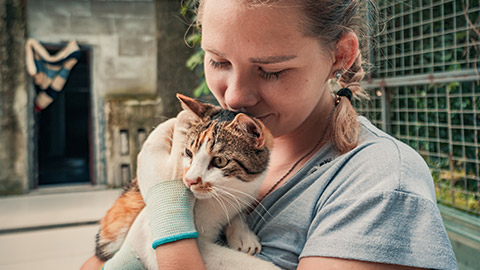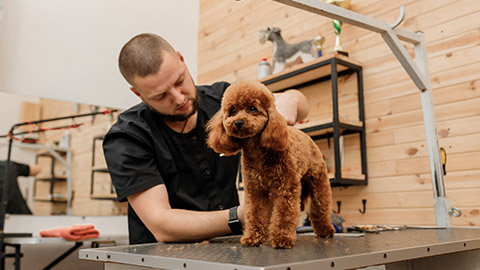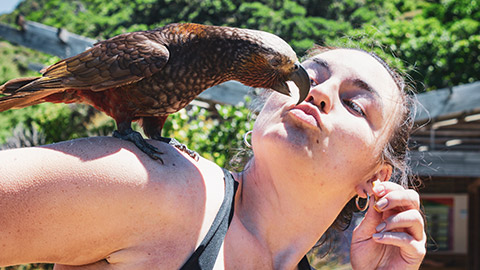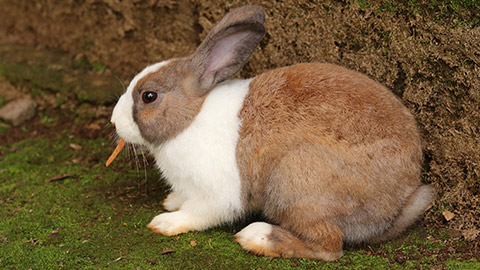[Placeholder for Synthesia Overview video]
Hello animal lovers, and a very warm welcome to the first Module of Certificate in Animal Care (Level 3). Here’s what we’re going to be looking at in the first few weeks. Me tīmata tātou! Let’s get learning!
This course will give you a bird’s eye view (pun intended!) of what it means to work in the animal care industry. We’re starting with the long view – how far you can take your career and what kinds of options are available. We’ll touch on some basic background to the industry, including kinds of workplaces, codes of conduct and what’s expected of you as a worker. Central to the learning in this module is the importance of maintaining interpersonal relationships in the animal care industry and what this looks like, ethical behaviours for employees, and recognising the place of the Treaty of Waitangi. We’ll wrap up with the kinds of day-to-day care and routines that you can expect as a worker in the animal care industry.
Our focus will be on the following companion animals: cats, dogs, rabbits, rodents (rats and mice), and birds. For those of you with an interest in other animals that have a companion role in your life, then the information in this Level 3 programme will still be useful for you.
| Credits | 5 |
| Learning Hours | 50 |
| Learning Outcome | LO1.1 Maintain positive interpersonal relationships and ethical behaviour in an animal care and welfare setting |
| Assessment | ANML01A1 |
You are free to plan your studies in the way that works best for you, but we know that guidance on how to do this is also helpful. We suggest the following way to navigate through the learning content over the next few weeks:
Weeks 1-2 Part-time Learners |
Topics:
|
Weeks 3-4 Part-time Learners |
Topics:
|
Weeks 5-6 Part-time Learners |
Topics:
|
Module 1 Assessment Information
There is one assessment for this module. It is due at the end of the module. It will be completed online. More information about the assessment can be found at the end of the module, and also on the assessment page in the navigation panel on the left.
You’re here because animals are important to you. You might already be working with animals and want to take the next step in your career, or you might simply just want to know more about the animals that you already share your life with. Whatever your ‘why’, we hope that this course will be meaningful for you and mirror your personal learning journey. For that reason, we’d like to introduce you to Emily, Caleb, Zoe, Aroha and Kai. They will appear in key places as we progress through the course to provide specific contexts for you to think about and compare to your own experiences and goals.
Case Study
Meet Emily

Hiya! My name is Emily, and I'm a 19-year-old with a deep passion for animals, especially cats. I just started working part-time as a volunteer at the SPCA in Wellington. It's the first step towards my goal of becoming a veterinary nurse. I’ve started studying this Level 3 Certificate in preparation for getting into further study.
Growing up, my family and I had three wonderful cats, and they were like family to me. However, one of them, my ragdoll Clawdia, had congestive heart failure.
This was a turning point in my life. I found myself researching cat health and care. I was determined to provide the best possible life for Clawdia. Through what I learned, I managed to help turn her health around. She lived an additional six precious years after her diagnosis, and seeing her happy and healthy gave me inspiration to pursue a career in veterinary nursing.
Working at the SPCA as a volunteer while I study is really rewarding. I can make a real difference in the lives of animals in need, just as I did for my own cat. Every day is a learning opportunity, and I'm soaking up every bit of knowledge and experience that comes my way.
In the future, I hope to continue my education and training to become a skilled veterinary nurse. I'm confident that I'll achieve my dream! Nice to meet you all!
Case Study
Meet Caleb

Heeeeey friends, I'm Caleb, and 26 years old. Currently, I'm giving puppers the glow-up at a small dog grooming company here in Hamilton, and it's a job I just adore. The little guy in the picture with me is one of our regulars.
I've always had a soft spot for dogs. It's no surprise that I ended up in this line of work, where I get to spend my days with these furry companions.
Working part-time at the dog grooming company has been an incredible learning experience. The more I know and the better the skills I have, the more in control I will be of my own destiny. There's something about seeing a scruffy pupper come in and leaving the salon looking and feeling like a glam superstar.
My dream is to gain more qualifications and experience in the world of dog grooming. I want to become an expert in my field, and that’s why I have enrolled in this certificate. With every dog I groom and every new technique I learn, I'm one step closer to my goal of starting my very own dog grooming business.
Who knows, maybe one day, you'll be bringing your puppos to my very own dog grooming salon here in Hamilton!
Case Study
Meet Zoe

Kia ora! I'm Zoe. I’m 29 years old, and while I currently work in the banking industry, my heart truly belongs to working with animals. I want to follow my passion and create a business that brings joy to both dogs and their humans.
There's something magical about the way dogs make you feel. They don't care about your job title, your fancy clothes, or whether you've had a bad day. They love you for who you are, and that's a beautiful thing. I find it easier to get along with animals. I can tell what they want, and they're always pleased to see you. With dogs, there's no need for masks or pretences; you can be your real self. That's the authenticity I crave, and that's what I want to bring to the world of dog walking.
My dream is to create a dog walking business in Auckland that goes beyond just exercise. Studying in this course will get me the credentials I need to start out on my business.
Case Study
Meet Aroha

Kia ora koutou, I’m Aroha. I’m 21 years old. I'm currently working full-time as a retail assistant at a pet store in Christchurch. My dream is to one day become a store manager or even a store franchise owner. But I know that in order to achieve that, I'll need to gain a competitive edge to climb that career ladder one step at a time. So, I signed up with NZMA for this programme.
Animals have always held a special place in my heart. From a young age, I've shared my life with a variety of pets - birds, fish, cats, and dogs. Even as a child, I was the one rescuing baby birds and asking to look after foster kittens. That’s me making friends with a kea on a family walk in Arthur’s Pass last summer.
Working at a pet retail store has been awesome for me. It's the perfect blend of my passion and profession. Every day, I get to interact with people who love animals. But I don't want to stop here. I'm determined to do the mahi and grow in this industry. I'm constantly seeking new opportunities to expand my knowledge about pet care, from the latest trends in pet nutrition to the best training techniques for different breeds. I believe that being well-informed is crucial to my dream of becoming a store manager or even owning my own pet retail franchise someday.
Case Study
Meet Kai

Hello, I'm Kai (they/them). I guess you could say I'm somewhat of an introvert. I tend to stay home a lot, mainly because of my anxiety.
But at home, I’ve got my two rabbits, Freya and Ravenna. They're Dutch rabbits, Freya is black and white, and Ravenna is brown and white. Taking care of them has become a form of therapy for me. It's a way to focus on something positive and nurturing. I’ve shared a picture of Ravenna because I don’t like to post pictures of myself.
Rabbits can be quite the handful. They require a lot of care and can get sick quite quickly, so I'm keen to learn more about how to best provide for them. That’s why I signed up for this course.
Activity - Hei Mahi
Share in the forums a little about yourself and your reason for studying this course. And, of course, feel free to introduce us to any animal members of your family!

How good are your IT skills?
How good do you think you are at using a computer to study on? Let’s find out. You don’t need to share your responses to this activity - this is just for you to think about how well you can use IT skills to find information to help you in your studies. It will highlight any skills you need to work on. As you go through the course, come back to this self-assessment to see how your skills are developing.
Activity – Hei Mahi
For each question below, rate yourself on a scale from:
1 (I need to practice this) -> 2 (I’m sometimes ok with this but am still learning) -> 3 (I’m pretty good at this)
- I can write my own study notes to use to help me learn
- I can write confidently in formal English
- I am confident listening to online content like videos or podcasts
- I know the main ideas in online content or podcasts when I hear them
- I am confident reading online articles
- I can find the main ideas in online articles
- I can understand graphs, charts, tables and infographics when I see them
- I can write about and explain graphs, charts, tables and infographics that I have seen
- I can type my assessments on a computer using MS Word or Google Docs.
- I can print my documents when they are completed, using a printer.
If you would like to refer back to this evaluation as you move through your studies, you can keep a record of your results by downloading this worksheet and saving it to your device.
Study Tip
- Create a folder on your device and call it Animal Care Level 3.
- Inside that folder create another folder and call it Module 1.
- Save your IT Skills evaluation there so that you can find it easily.
Topic 1 Summary
Just like that we are through the first topic! To recap, we have covered:
- What’s in this Module.
- How you can approach or plan your learning.
- What kind of assessment there will be.
- An introduction to our case study characters.
- ‘What’s your Why’ introductions on the course forum page.
- Where you are at with the kind of IT skills you will need for studying on this course.
- Creating a folder on your device for keeping all the awesome notes you are going to make as you move through your studies.
And that’s us done for Topic 1. Haere whakamua! Moving ahead!
